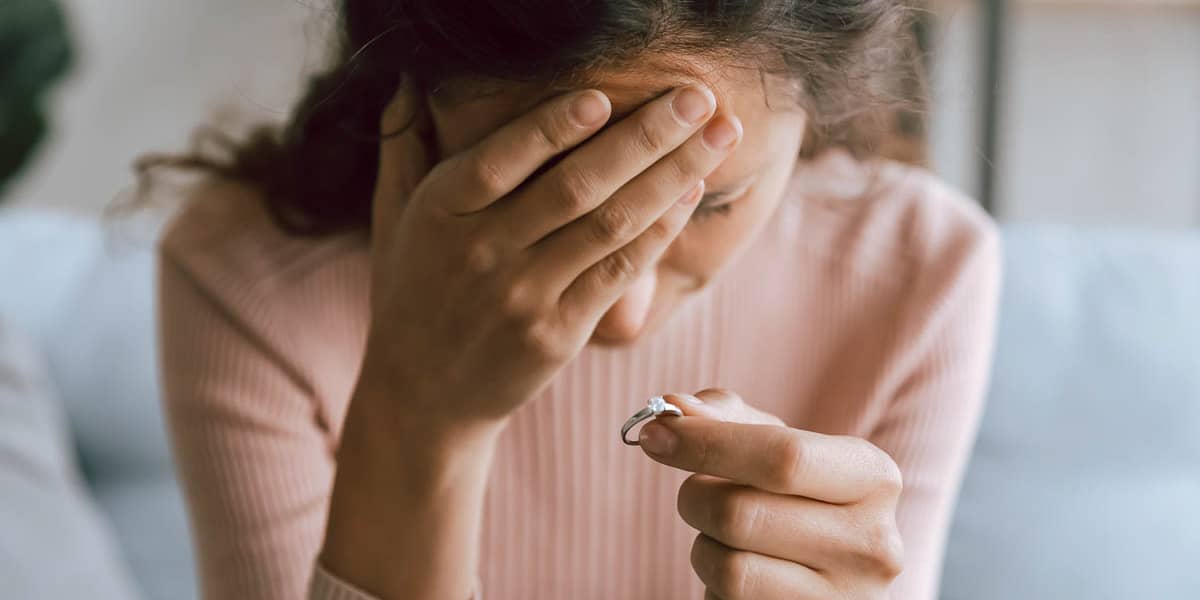How Do You Grieve a Lost Love?

- Loss comes in many forms
- Understanding the grief stages can help
- Grief is not linear
- Tips for your survival
Although we usually think of grief in terms of the death of a loved one, grief can be the response to any significant loss, including the end of a relationship. In fact, lost love brings its own unique type of grief.
The loss of a relationship, whether it’s a break-up, the lingering ache of a past love, or the complex reactions to an ongoing divorce, triggers deep emotions, bittersweet memories, and often what seems like insurmountable pain. If you’ve lost someone in a break-up or divorce or find yourself reminiscing about a past relationship that has ended, how can you navigate the hurt so you can move forward?
Loss comes in many forms
Loss. You may have lost a beloved pet, got laid off from a job, or lost an attachment to ideas or old goals. While each loss is unique, they share a common thread – life will never be the same as it was.
Loss is inevitable in life, but some losses entangle your heart so much, they are difficult to overcome. Losing a former partner is often one of these.
From a small spark of sadness to something that brings you to your knees, moving through your grief after this kind of loss will test your spirit in undeniable ways.
Understanding the grief stages can help
In her pivotal work on near-death experiences and terminal illness, Elizabeth Kubler-Ross developed what she called “the five stages of grief.”
While her stages specifically dealt with grief after a death, they can also be applied to the loss of a relationship.
- Denial: Denial is often the initial stage of grief. It is the difficulty one has accepting the loss of a relationship. Denial works as a defense mechanism to lessen the immediate shock of the loss.
- Anger: Anger sets in once reality takes over. It can be a pervasive anger toward the situation in general or directed toward the other person or even yourself.
- Bargaining: The bargaining stage refers to times you may try to evaluate what you might have done differently to save the relationship.
- Depression: Depression and profound sadness set in when you understand it is truly over..
- Acceptance: Acceptance is when you have finally come to terms with your loss and begin to move forward. In this stage, you can finally find peace.
Grief is not linear
These “stages” can make it seem like there is a linear transition through each step, and then you’re done. But grief is a process, and like any intensely emotional transition, it isn’t linear.
The stage of emotions you feel can change from day to day or even hour to hour. You may think you’ve finally finished your grief process when you are suddenly blindsided by a photograph at the back of a drawer or a song playing at the supermarket. It can all come crashing down out of nowhere, even years later. Indeed, you may feel like you’ve started at square one multiple times.
Resurgent feelings during grief are real and natural. Each time the emotions resurface, part of the healing process is letting yourself feel them and deal with them as they arise. Despite their reappearance, they will lose their sting over time.
Tips for your survival
Navigating through the grief of a life-changing loss can feel crippling. And yet, your healing depends on it. With time, the sadness will ease, and the sense of loss will dull. Eventually, you will find peace of mind and the freedom to move on with the rest of your life.
Until then, it will be difficult, and you will have to find ways of coping that feel right to you.
How do you do this?
- Allow yourself to feel the painful feelings. They will come and go, and trying to suppress them may prolong the already seemingly interminable healing process.
- Get support. Gather family and friends around you to fill the empty spaces. Consider a support group, or reach out to a therapist for professional help. We all need help at points in our lives. No therapist would doubt your reason for seeking help at this difficult time.
- Shake up your routine. Grief can be triggered by well-entrenched habits that pique memories. Creating new habits will eventually feel normal and purposeful, and a new routine can keep you from those recurring triggers.
- Rediscover who you are. Love may have forced you to leave bits of yourself behind. Use this time to revisit passions and interests that make you happy and fulfilled.
- Don’t let yourself numb. While it’s normal to want to numb the pain, unhealthy coping mechanisms will only make things ultimately worse than they are.
- Be compassionate with yourself. This kind of healing takes an unknown period of time, and it’s okay to be exactly where you are in the process.
- Embrace the changes. It will feel uncomfortable at first, but growth requires change and new experiences. Accept that your life has changed, and it’s time to move on.
Find a mental health professional using the American Psychological Association's online tool, the Psychologist Locator.
Grieving a lost love is a very personal and painful process. People experience it differently, but most of us do go through it at least once in our lives. By understanding that grief is valid after losing a relationship and recognizing the stages of the process, you can approach your healing in a healthy way, allowing yourself some well-deserved time and self-compassion.
Hello Divorce consists of a network of caring professionals who want to help you get to the other side of your grief and help you feel the excitement of a promising future and new life. Schedule a free call with us to learn more about our services.
Suggested reading: Complicated Grief: When the Hurt Won't Go Away
Resources
Elisabeth-Kubler-Ross. Brittanica.com.Psychologist Locator. APA.



